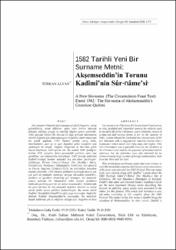1582 Tarihli Yeni Bir Surname Metni: Akşemseddin’in Torunu Kadîmî’nin Sûr-nâme’si
Künye
ALVAN, Türkan. "1582 Tarihli Yeni Bir Surname Metni: Akşemseddin’in Torunu Kadîmî’nin Sûr-nâme’si". Divan Edebiyatı Araştırmaları Dergisi, 25 (2020): 1-77.Özet
Sūr-nameler Osmanlı toplumunun gündelik hayatını, saray geleneklerini, sanat dallarını, satan eseri üretim sürecini anlatan, oldukça zengin ve nitelikli bilgiler içeren eserlerdir. 1582 yazında Sultan III. Murad III oğlu Şehzade Mehmed’in sünnet düğünü için elliyi aşkın gece ve gündüz süren muazzam bir şenlik yaptırdı. 1582 Sünnet Şenliği saray halkı, İstanbullular, yurt içi ve yurt dışından gelen misafirler için muhteşem bir olaydı. Düğüne Doğu’dan ve Batı’dan gelen birçok büyükelçi, vekil iştirak etti. Bu makale 1582 Şenliğine katılan XVI. yüzyılın ikinci yarısındaki şairlerin caize için yazdıkları sur-nâmelerden bahsediyor. 1582 Şenliği hakkında Kadîmî’ninkiyle beraber müstakil beş sûr-nâme yazılmıştır. Gelibolulu Âlî’nin Câmi’u’l-Buhur Der Mecâlis-i Sûr’u, İntizâmî’nin Sûrnâme-i Hümâyûn’u Ferâhî’nin Sûr-nâme’si ve Derviş Paşa’nın Zübdetü’l-Eş˘âr bu festivalden bahseden önemli eserlerdir. 1582 Sünnet şenlikleri vesilesiyle devrin pek çok şairi de padişaha sunduğu sûriyye türündeki kasidelere, tarihlere ve gazellere dîvânında yer vermiştir. Bu makalede esasen Şehzade III. Mehmed’in 1582 Sünnet Şenlikleri hakkında yazılmış yeni bir sûr-nâme tanıtılacaktır. Kadîmî adlı bir şaire ait olan bu Sûr-nâme431 beyitten ibarettir ve eserin içinde farklı nazım şekilleri kullanılmıştır. Bu eserin sahibi Kadîmî, Hamdullah Hamdî’nin oğlu veya torunudur. Başka bir ifadeyle Kadîmî Akşemseddin’in torunudur. Bu makalede hayatı hakkında çok az bilgimiz olduğu için, belgelere ve bazı ipuçlarına göre Kadîmî’nin hayatı hakkında analizler yapılmıştır. Sūr-nama texts (The texts of Circumcision Feast) serves as rich, qualified and important sources for subjects such as the daily life of the Ottomans, court traditions, means of production and various forms of art. In the summer of 1582, Sultan Murad III celebrated the circumcision of his son Mehmed with a magnificent imperial festival (sūr-ı humāyūn) which lasted over fifty days and nights. This Sūr-ı Humāyūn was a splendid event for the members of the Ottoman court and for the populace of Istanbul and its environs; but the festivities were also attended by an extraordinarily large number of foreign ambassadors, both from the West and the East.
This article focus on literary works that were written to meet the immediate concerns and the personal expectations of the poets who attended the 1582 Festival. Five sūr-nama texts were written along with Qadímí 's poem about the 1582 Festival. Câmi’u’l-Buhur Der Mecâlis-i Sûr of Gelibolulu Âlî and Sûrnâme-i Hümâyûn of İntizâmî, Ferâhî’s Sûr-nâme and Dervish Pasha’s Zubdatu’l-Aş˘âr are the most important literary works describing this festival. In addition, many poems were presented to the sultan for this festival. This article will introduce a new sūr-nama consisting of 431 couplets about the 1582 Festival. The author of this Sūr-nama is Qadímí being the grandson of Akshamsaddin. In other words, Qadímí is Hamdullah Hamdí’s son or grandson. He died when he was a clerk at the Topkapı Palace in 1587. In this study, some analyzes were made to shed light on Qadímí’s unknown life based on the documents.



















